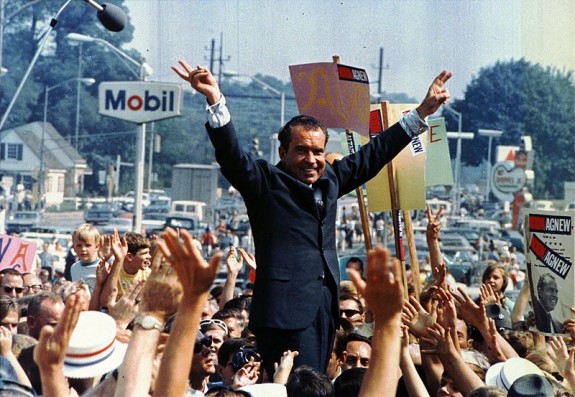Nixon Prolonged Vietnam War for Political Gain—And Johnson Knew About It, Newly Unclassified Tapes Suggest
Nixon ran on a platform that opposed the Vietnam war, but to win the election, he needed the war to continue

Richard Nixon during the 1968 presidential campaign. Photo: Ollie Atkins
In 1968, the Paris Peace talks, intended to put an end to the 13-year-long Vietnam War, failed because an aide working for then-Presidential candidate Richard Nixon convinced the South Vietnamese to walk away from the dealings, says a new report by the BBC’s David Taylor. By the late 1960s Americans had been involved in the Vietnam War for nearly a decade, and the ongoing conflict was an incredibly contentious issue, says PBS:
In 1967, with American troop strength in Vietnam reaching 500,000, protest against U.S. participation in the Vietnam War had grown stronger as growing numbers of Americans questioned whether the U.S. war effort could succeed or was morally justifiable. They took their protests to the streets in peace marches, demonstrations, and acts of civil disobedience. Despite the country’s polarization, the balance of American public opinion was beginning to sway toward “de-escalation” of the war.
Nixon’s Presidental campaign needed the war to continue, since Nixon was running on a platform that opposed the war. The BBC:
Nixon feared a breakthrough at the Paris Peace talks designed to find a negotiated settlement to the Vietnam war, and he knew this would derail his campaign.
… In late October 1968 there were major concessions from Hanoi which promised to allow meaningful talks to get underway in Paris – concessions that would justify Johnson calling for a complete bombing halt of North Vietnam. This was exactly what Nixon feared.
President Johnson had at the time a habit of recording all of his phone conversations, and newly released tapes from 1968 detailed that the FBI had “bugged” the telephones of the South Vietnamese ambassador and of Anna Chennault, one of Nixon’s aides. Based on the tapes, says Taylor for the BBC, we learn that in the time leading up to the Paris Peace talks, “Chennault was despatched to the South Vietnamese embassy with a clear message: the South Vietnamese government should withdraw from the talks, refuse to deal with Johnson, and if Nixon was elected, they would get a much better deal.” The Atlantic Wire:
In the recently released tapes, we can hear Johnson being told about Nixon’s interference by Defence Secretary Clark Clifford. The FBI had bugged the South Vietnamese ambassadors phone. They had Chennault lobbying the ambassador on tape. Johnson was justifiably furious — he ordered Nixon’s campaign be placed under FBI surveillance. Johnson passed along a note to Nixon that he knew about the move. Nixon played like he had no idea why the South backed out, and offered to travel to Saigon to get them back to the negotiating table.
Though the basic story of Nixon’s involvement in stalling the Vietnam peace talks has been around before, the new tapes, says the Atlantic Wire, describe how President Johnson knew all about the on-goings but chose not to bring them to the public’s attention: he thought that his intended successor, Hubert Humphrey, was going to beat Nixon in the upcoming election anyway. And, by revealing that he knew about Nixon’s dealings, he’d also have to admit to having spied on the South Vietnamese ambassador.
Eventually, Nixon won by just 1 percent of the popular vote. “Once in office he escalated the war into Laos and Cambodia, with the loss of an additional 22,000 American lives, before finally settling for a peace agreement in 1973 that was within grasp in 1968,” says the BBC.
More from Smithsonian.com:
/https://tf-cmsv2-smithsonianmag-media.s3.amazonaws.com/accounts/headshot/smartnews-colin-schultz-240.jpg)
/https://tf-cmsv2-smithsonianmag-media.s3.amazonaws.com/accounts/headshot/smartnews-colin-schultz-240.jpg)